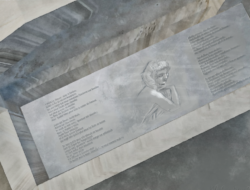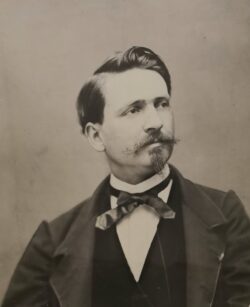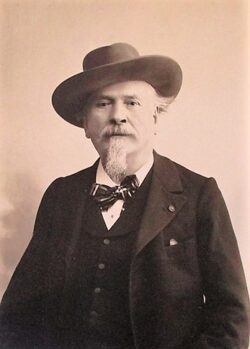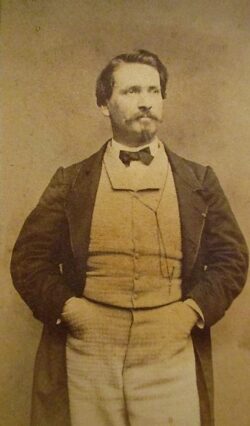-
Frédéric MISTRAL
- Home /
- See & do all year round/
- Activities/
- Tours/
- Frédéric MISTRAL
Frédéric MISTRAL
"Fondateur du félibrige"Designed by Les Ateliers BRIAND, Sylvain FUCHS
To tackle a Nobel Prize winner in literature requires an understanding of his work and his life. The CCTP proposes Mireille
as a literary reference. This choice illustrates the autobiographical aspect and its transposition into the character of
Mireille. The marriage of reason versus the marriage of love.
We have chosen a passage that we feel highlights this forbidden love, the end of innocence. Song
5, Vincent and Mireille are alone in the garrigue and Vincent asks Mireille for a kiss. She is worried about being
seen. Vincent recites a poetic parable about the love of two flowers. This is the turning point in the story
into tragedy, against established morality. The young girl has refused, she won't have time to experience
her love. Death will not spare them. The premonition has come true.
The work, written in the langue d'Oc and translated by Frédéric Mistral himself, is considered a literary monument.
literary monument. The sentences are chiselled and precise. We have chosen to make the link between the writer and his mirror.
So, like the mirrors in the parks of castles, Mireille will be the reflection of Frédéric Mistral. A plaque with an
engraved bas-relief of a young woman surrounded by the literary passage in French and Occitan will be placed at the bottom of the fountain basin.
basin of the fountain. The reflection of the author's statue will make sense of the text of the two flowers, impossible and tragic loves
and tragic loves.
It is impossible for us to decontextualise the statue from the artistic style of the period: Romanticism. It had to be worked
academically in a block of stone and (without any pretence) inspired by the statues of Camille Claudel.
We should feel her sadness at the loss of her love. This monolithic bust will be accompanied by a slim silhouette
in stone. A human embodiment of the author, a reminder that Mistral was above all a man.
Sylvain FUCHS.
Frédéric MISTRAL. (Maillane 1830 – Maillane 1914).
Poet, félibre, lexicographer, translator, Capoulié of the Félibrige, Nobel Prize for Literature. The son of a farmer, he was born at the Mas du Juge in Maillane.
In 1854, with a few friends, Mistral and Roumanille founded the Félibrige, a cultural organisation that still exists today in all 32 departments of the langue d’oc. He was its Capoulié from 1876 to 1888. In 1859, he published his 1st poem, Mirèio; it was the beginning of his fame. Charles Gounod turned it into an opera in 1863. His essentially poetic work includes
Mirèio, Calendau, Nerto, La Reino Jano, Lou Pouèmo dóu Rose and 2 collections of poetry Lis Isclo d’or and Lis Óulivado, not forgetting his prose in Armana
Prouvençau, the newspaper L’Aiòli, which he founded and edited from 1891 to 1899, Discours e dicho and especially Memori e raconte, in which he recalls his childhood memories.
He translated Genesis into Provençal and produced the great Provençal-French encyclopaedic dictionary Lou Tresor dóu Felibrige.
In 1899, Mistral created the 1st true museum of ethnography, Le Museon Arlaten. In 1904, he was awarded the Nobel Prize for Literature. On his death, he donated his house to the Maillane town council to establish his museum.
Thanks to the commune of Maillane. Click here to discover the interactive terminals in Maillane!
Link to the Félibrige:
https://www.felibrige.org/le-felibrige/vocabulaire/


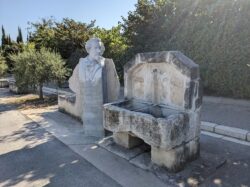
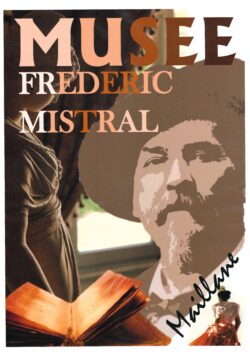
MUSEE DU MISTRAL: CLIQUEZ ICI
L’œuvre en place et le projet à venir pour la fontaine:

